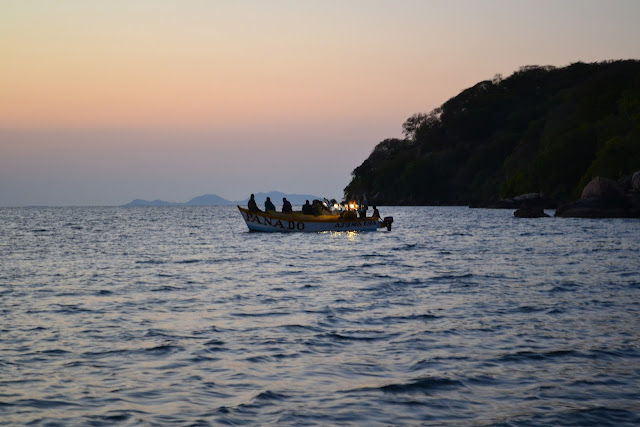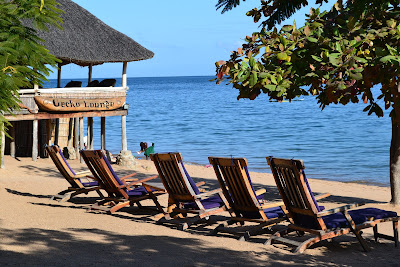To continue from where we left off in Blantyre: We left Blantyre around 7h00 on Sunday morning and headed for Mulanje (the town) because we planned to climb Mulanje (the mountain). We had been given some good advice and decided to start at the Lujeri tea estate and climb to Madzeka hut, where we would stay the night and descend the next day.
Mount Mulanje is apparently the highest free standing land mass in Southern Africa. I'm not sure how that makes it different to a mountain range (which it looked like to me) but every mountain wants its claim to fame. As far as I was concerned, it was beautiful and worth the effort, regardless of the terminology used to define it.
Sapitwa is the highest peak at 3000m, but we weren't planning on going that high.
Mulanje and Thyolo are tea growing districts and the landscape and climate are completely different from the rest of Malawi. Because of the mountains, there is rain all year round, and the green of the tea plantations was fluorescent. With the mountain rising behind, the landscape was picture perfect.
We arrived at Lujeri Estate's shed no. 3 just before 9h00 and found porters waiting for us. We had called the estate the day before, saying we planned to arrive at 7h30 and would need two porters.
As we drove up to the arranged meeting place, a whole group of eager men peered down the road at us, watching in anticipation. We deduced that these were the porters, but there were more than the two we had asked for and we were a bit unhappy about having to choose two from a group of 8 or so. However, there was no issue, because the porters have a prearranged rotation schedule, to try to make sure that everyone gets a fair chance to work.
One came up to us, even before the car had stopped and spoke to us in relatively good English. He introduced himself as Freddy and said he and Maxwell would be our porters. He asked how long we would be going for and where we wanted to stay. We told him and asked what the rate was. He took us into a little "office" where the official rates were printed out and we had to sign our names in a log book. The rate for parking our vehicle was also stated.
Once the official business was behind us, we started out without further delay.
Almost immediately upon setting out, we were set upon by a group of excited children walking behind us. When I took out my camera, they all crowded round, including an older teenage girl who was working nearby. They were most excited to see the picture of themselves on the camera screen afterwards and would've gone on posing for me for the rest of the morning, probably. After the photography session they felt more familiar with us and walked alongside, instead of behind. Anna practiced her Chichewa with them a little, and they were quite amused. When the road forked, they went on their way to their village.
After crossing a small river, we came to the village where the porters wanted to buy food. The agreement is that you give them about 25% of their payment upfront, and they provide their own food. We could've gone around the outskirts of village with Freddy, while Maxwell went into the village to get the supplies. But I thought I'd be able to find some bread in the village, to have for lunch, so we all walked into the village. As we approached, we heard little feet running toward us, accompanied by: "
Mazungu! Mazungu!"
The children followed us through the village and the crowd got bigger as we went along. We didn't find bread at the first shop, so we tried another. I ended up settling for cassava, because the only bread we found was growing mould. The children never got tired of watching the whole process. And when the camera came out, they tried all sorts of poses to stand out in the picture. They were highly encouraged by the fact that they got to see themselves afterwards. Even some of the adults were curious and stood by watching.
Eventually Freddy had to chase the more determined children home, as we left the village and headed up the mountain. Somewhere during the walk through the village, Maxwell had disappeared and went to get more substantial supplies for the two of them.
We waited in the shade by a cool stream for him, which was a good resting spot, as the sun was getting high and it was starting to heat up. The water was very clear, but Freddy said we shouldn't drink it, as it was too near to the village. I did rinse my hands in it though, and splashed some on my face to cool down.
Maxwell came back with what looked like enough food for a week! Then our climb started in earnest. The porters with our two backpacks bounded along effortlessly. Maxwell was carrying all their food in a big plastic bag without handles in one hand, besides the backpack, and managed to leave us behind. Freddy walked behind us and at times needed to push me up! He told me I have very bad balance, or he might have said
no balance!
When we stopped for lunch, we were apparently half way there. But with hindsight, I question that estimation. In Malawi, if you ask how far, the answer is always: not far. On the way down, the lunch spot seemed much nearer to the bottom than the top.
After about 5 hours of climbing, we finally arrived. We were drenched. Besides the sweating, it had also started to rain during the climb. When we arrived at the hut, the watchman had already started a fire inside and was busy cutting more wood so we'd have enough for the night. There was also a bucket of water for us, to use for tea or coffee and cooking. Cold mountain water, straight from the river below the hut. No villagers up on the mountain, so the water is safe to drink.
Freddy helped us to unlock the doors of the heavy cupboard where all the cooking utensils were kept. We got a kettle boiling for tea and we put on dry clothes and socks, to try to warm up. It was only around 15h00 and already we were wearing jackets. We knew it was a cold night ahead.











































